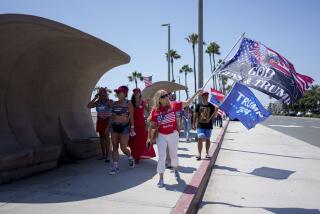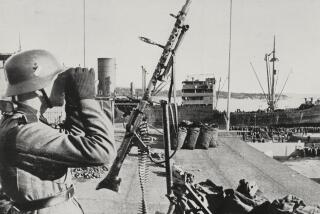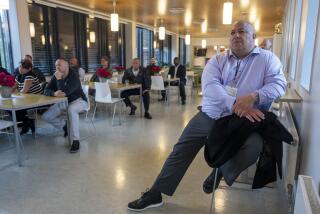Norway attacks shatter a nationâs innocence
Reporting from Oslo â Norwegians have always taken pride in their open, trusting society.
Itâs a country where you might encounter the prime minister at the grocery store and offer a hug. Many police donât carry guns and most government buildings are unprotected. Homicide is rare, with only a handful of gun-related deaths a year.
But as Otto Lovik stood Sunday on a muddy lakeshore overlooking Utoya Island and recalled how he rescued about 60 people fleeing Fridayâs massacre by a gunman, the 56-year-old prison guard, still shaking from the experience, said his country must change.
Photos: Deadly attacks shock Norway
âWe canât go back to being open and trusting after this,â said Lovik, who loaded his boat with so many terrified, bleeding victims that he feared it would capsize. âThis is the price we must pay.â
As Norway recovers from the initial shock of the shooting rampage and earlier Oslo bombing and begins the mourning process for at least 93 people who were slain, many predict the nation will never be the same.
âItâs going to have a deep, long-lasting impact,â said Atle Dyregrov, director of Norwayâs Center for Crisis Psychology, which has helped other countries recover from disasters, including the 2008 China earthquake and this yearâs Japanese tsunami.
âOur innocence is lost,â he said. âWe used to think that these things only happened in other countries, not here. Now that illusion is shattered forever.â
He predicted that Norwayâs relaxed security policies and reluctance to impinge on civil rights will give way to familiar restrictions already in place in other Western nations, including limited access to government facilities and increased surveillance of suspected extremist groups. He likened the changes to Swedenâs security tightening after the 1986 assassination of Prime Minister Olof Palme.
On Sunday, however, the nationâs focus was on grieving and healing. National flags throughout the capital flew at half staff.
At the ornate Oslo Cathedral in the heart of the capital, hundreds participated in a national mourning ceremony attended by the prime minister, King Harald, Queen Sonja and some of the young people who escaped the island attack. The suspect, Anders Behring Breivik, is expected to be formally charged Monday.
âA heavy darkness is now clouding our lives,â Bishop Helga Haugland Byfuglien told tearful mourners, urging them to maintain their faith in the goodness of Norwayâs people and commitment toward an open society.
In an emotional address, Prime Minister Jens Stoltenberg said Norway would not be cowed. âOur answer is more democracy, more openness, more humanity, but never naivete,â he said.
Outside the cathedral, just blocks from the site of the Friday bomb blast that killed at least eight people, well-wishers laid flowers and candles in a makeshift memorial that by nightfall was spreading into the streets.
Waiting in line to enter the cathedral to pay her respects, Oslo resident Christine Arnese, a 47-year-old nurse, stood alone with tears streaming down her cheeks.
âI think this might bring us all closer together,â she said. âItâs important that we keep our country free and open.â
But as the scale of the tragedy sunk in, fears about possible future attacks were already leading some Norwegians to call on the government to bolster security. Some said that police guards who were dispatched to government facilities in the hours after the attacks should become permanent fixtures.
Others called for tougher punishments for terrorists, complaining that estimates that Breivik would face only 21 years in prison if convicted underscore the inadequacy of current law.
âWe have to do more to protect ourselves,â said Julie Groseth, who works at a small market overlooking Utoya Island in the community of Hole. She said she worried about copycat attacks.
âMaybe that means not being as open to other countries,â she said. âThis has showed us how weak Norway is in the war against terrorism. We are not prepared.â
At one of Osloâs main mosques, many Pakistan-born immigrants expressed apprehension about how the attacks may affect Norwegian society and its tolerance of foreigners.
âWhen we first heard about the attacks, we all gathered together and prayed,â said mosque official Mohamed Suleiman, who moved to Norway 35 years ago. First they prayed for the victims, he said. Then they prayed that the perpetrators would not turn out to be Islamic extremists. The country has reason enough to fear retribution from overseas extremists: Its troops serve in Afghanistan, where 10 Norwegian soldiers have been killed.
Though he said they were relieved to hear authorities describe Breivik as a home-grown terrorist who acted alone, some remain concerned that any tighter security rules or rising public anxieties might nevertheless trigger a backlash against them. At times in the past, the increasing presence of immigrants and foreigners in Norway has come under criticism from conservative parties.
âWeâve never really had a problem before,â Suleiman said. âBut still, itâs in the back of our minds.â
Photos: Deadly attacks shock Norway
More to Read
Sign up for Essential California
The most important California stories and recommendations in your inbox every morning.
You may occasionally receive promotional content from the Los Angeles Times.










